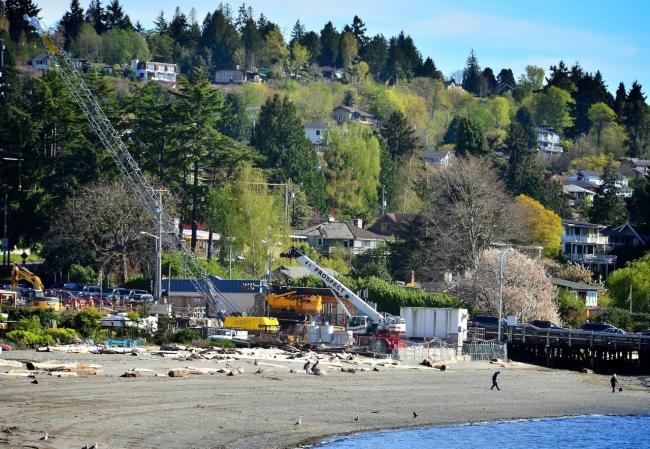King County announces agreement with feds to fund long-term runoff pollution projects, including some in West Seattle
Improvements to the Barton Pump Station next to the Fauntleroy Ferry Dock are already underway, and King County announced an agreement with the federal government on April 16 to fund this and other pollution runoff improvements over the long term.
Tue, 04/16/2013
On April 16, King County announced the finalization of a long-term agreement with the federal government to fund pollution control programs to reduce polluted runoff dumping into Puget Sound and the Duwamish River.
Those projects include improvements to the Barton Pump Station and a series of bioretention swales (similar to rain gardens) in the Sunrise Heights and Westwood neighborhoods of West Seattle.
King County Press Release:
Agreement ushers in final phase of King County’s pollution control program
Long-term plan affirmed by feds; protects public health and water quality in Puget Sound, Duwamish River through partnerships and more green infrastructure
An agreement with federal agencies marks the final phase in King County’s long-term plan to protect regional water ways from overflows of stormwater and sewage that occur during heavy rains.
“We are poised to make significant investments in projects that will support the cleanup of both Puget Sound and the Lower Duwamish, and lead to a healthier environment for the people who depend on these waterways for work and recreation,” said King County Executive Dow Constantine.
Under an agreement with the U.S. Department of Justice and the Environmental Protection Agency that was lodged today in federal court, King County will complete nine projects as part of its long-term plan to control combined sewer overflows, or CSOs, that still occur at 14 locations in the Seattle area.
CSOs are small amounts of sewage mixed with stormwater that discharge into local water bodies during heavy rains when wet weather fills sewers to capacity, preventing backups in homes, streets, and businesses. State law already requires King County to limit these overflows to one per year at each outfall by 2030.
Since the 1970s, King County has successfully reduced volumes of untreated discharges and uncontrolled CSOs in area waterways by more than 90 percent. King County’s long-term control plan was recently amended to make projects on the Duwamish River the highest priority in alignment with the County’s equity and social justice principles.
The agreement gives King County project flexibility opportunities such as green infrastructure projects like rain gardens, permeable pavements, and green roofs to keep stormwater from overloading parts of the regional sewer system.
“We are very proud of our CSO control program today, and we are diligently pursuing the last remaining projects,” said Wastewater Treatment Division Director Pam Elardo. “We’re especially excited about the possibilities for green stormwater infrastructure, because it offers communities so many benefits in addition to water quality protection.”
King County has already embarked on a green stormwater infrastructure project to control CSOs in Puget Sound near the Fauntleroy Ferry Terminal in West Seattle. The project entails building a system of bioretention swales in the public right-of-way along 15 city blocks in the Sunrise Heights and Westwood neighborhoods.
To augment its current CSO control program, King County also partnered with Seattle Public Utilities’ RainWise Rebate Program to encourage more people in certain areas in Seattle to install rain gardens and cisterns on private property.
Finally, King County supports grassroots efforts to improve water quality and air quality through its Green Grants Program tailored specifically to support cleanup efforts in Lower Duwamish basin communities.
By implementing these measures, King County will reduce the final CSO volumes by up to 99 percent, better protecting Puget Sound and the Duwamish River and people who use these waterways. The improvements and upgrades are expected to cost approximately $711 million in 2010 dollars.
Additional information about King County’s CSO Control Program is available on the Web atwww.kingcounty.gov/csocontrol.


